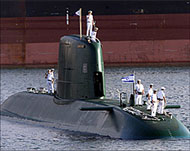Anti-Islam axis goes nuclear
Heightened technology sharing between Israel and India may soon see both countries transfer their nuclear capability to state-of-the-art attack submarines patrolling far offshore.

A clandestine programme to develop a new generation of potentially nuclear-capable hardware could see the first finished submarine models rolling off the production line within years, according to intelligence sources.
The programme to fast-track production of a new wave of submarines comes as the latest move to forge a new Indo-Israeli military and intelligence “axis”.
Officials on both sides have confirmed the multi-billion dollar deal will go ahead, in the wake of Israeli Prime Minister Ariel Sharon’s controversial visit to India this month, the first ever by an Israeli leader.
“A suggestion was made by defence officials on the Israeli side during Prime Minister Sharon’s visit,” said senior Indian defence ministry official Amitabh Chakrabarti.
“The offer is for India to be a partner in future ventures to manufacture submarines. The shape of the deal, and the details of what they want from our side are still being thrashed out.”
Israel’s misgivings
Indian defence minister George Fernandes is understood to have clinched the deal after giving a firm commitment not to share the “hyper-sensitive” technology with any third party, with Israel’s arch foe Iran, a close Indian ally, singled out as prime candidate.
|
Israel recently overtook Russia as the largest seller of weapons to India, with an annual trade of $2 billion |
“The Israelis did express some misgivings, but we offered firm assurances, which they accepted,” said Chakrabarti. “It is Indian policy to prevent leakage of technology on hyper-sensitive military hardware.”
Chakrabarti refused to rule out the possibility that a nuclear capability would be fitted to the vessels, in spite of previous claims they would be “conventional” in nature.
“From an official position, I shouldn’t talk about any nuclear aspect,” he said.
India is understood to be the junior partner in what is principally an Israeli initiative to develop the new hardware.
The Indian navy’s existing fleet of 16 ageing submarines are principally Russian-built, and New Delhi is also negotiating with Moscow to lease another two nuclear-capable Russian vessels.
But Israel recently overtook Russia as the largest seller of weapons to India, with an annual trade of $2 billion, while India superseded Turkey as Israel’s biggest client, accounting for almost half of Israel’s total $4.2 billion military sales.
Nuclear capable
Intelligence sources suspect that an advanced submarine model Israel recently acquired from Germany is being fitted with a nuclear capability.
“The Israelis have a remarkable new submarine, and for what they claim is a conventional model, it is being kept unusually classified,” said Rear Admiral Raja Menon, of the New Delhi based Institute of Defence Studies and Analysis.
 |
|
Israeli submarines could plug India’s perceived security gap |
“I wouldn’t put it past them to be seeking to fit the vessel with a capacity to fire nuclear-tipped cruise missiles. That would enable them to move their nuclear sites off land and into the sea, removing potential targets from their soil. That’s a big advantage.”
India has been engaged in a long-standing programme to develop nuclear-powered submarines, but its efforts have so far met with little success. Known in defence circles as Project 75, the plan to build a total 24 submarines has repeatedly run aground in recent years.
“India currently has a land and airborne nuclear deterrence capability, but its sea deterrence is missing,” said Rahul Bedi of Jane’s Defence India.
“India is well down the road in its programme to develop submarine-launched ballistic missiles that will ultimately be nuclear-capable, but the project has repeatedly stalled. India, like Israel, doesn’t yet have submarine launched missiles, and it badly needs them.”
Bedi added, “It makes sense for India to seek Israeli help in this area. Israel is into everything – aircraft, missiles, satellites, radars, submarines – and has sophisticated expertise that Russia cannot match. As Israel’s largest client, India’s military needs are catered for across the board. In terms of a timeframe on submarines, we are looking at two to three years.”
Israeli confirmation
Stringent Israeli government policy forbids any discussion of its secretive nuclear weapons programme. But Indian deputy Prime Minister Lal Krishna Advani, who chose Israel for his first official visit in the summer of 2002 has openly advocated nuclear co-operation with Israel.
“I am aware of the deal to co-operate on production of new submarines, but I cannot give further details at this stage,” said Yaron Mayer, spokesman for the Israeli embassy in New Delhi.
“The delegation that accompanied Prime Minister Sharon included a number of defence officials and arms manufacturing executives. Israel’s navy is highly advanced, and includes submarines. There is great scope for co-operation between the two sides in a number of areas of defence.”
News of the submarine deal was not made public during last week’s round of confidential defence and intelligence talks.
How to build an apartheid wall
 |
|
The wall is cutting through swathes of the West Bank |
Meanwhile, Tel Aviv also offered to share its expertise on the construction of electronic border fencing to seal India off from nuclear rival Pakistan, despite international condemnation of the apartheid wall – Israel calls it a security fence – it is building through the occupied West Bank.
“The issue of building a fence with Israeli help is on the table, Chakrabarti confirmed.”
Bilateral negotiations also resulted in confirmation of a further deal for at least three billion dollar Phalcon early warning radar systems, bringing large parts of Pakistani airspace under Indian surveillance. Israel is also seeking Indian investment in its $2.5 billion anti-ballistic missiles programme, pending approval from Washington.
Sharon’s visit provoked a storm of protest among Muslim groups in India, who fear the emergence of a new and potentially anti-Islamic alliance between Israel’s hardline Likud and India’s ruling Hindu-nationalist Bharatiya Janata Party, which would spell the end of India’s historic support for the Palestinian cause.
India’s 140-strong Muslim population – the second largest in the world – has been living in a climate of fear ever since last year’s communal riots in the western state of Gujarat, in which 2000 died.
Axis of abstraction
Israeli deputy prime minister Yosef Lapid rounded off his trip by claiming his country had forged an “unwritten and abstract axis” with India and the United States, in a bid to counter terrorism and bolster international security.
|
“India and Israel both feel vulnerable, with Israel fearing non-state actors and hostile neighbours, and India concerned over Pakistan” Uday Bhaskar, |
India was profoundly grateful for Israel’s willingness to step up arms sales when the US, UK and others imposed sanctions after India’s May 1998 nuclear tests. Since then, India has sought to modernise its army – the world’s fourth largest -with the kind of high-tech weaponry that Israel is developing.
“The nature of the weapons inventory sought by India makes Israel a key ally,” said former Indian naval commodore Uday Bhaskar, deputy director of the Institute of Defence Studies and Analysis.
“With the technological advances we’ve seen in recent years, India needs the hardware to upgrade its capabilities. As specialists in electronic warfare and surveillance equipment, Israel could offer India the niche weapons it wants.
The strategic axis would also offer a counterbalance to the perceived threat of a China-Pakistan alliance, highlighted by the recent test flight of new Sino-Pak CF-1 fighter jets, said to rival US F16s.
“India and Israel both feel vulnerable, with Israel fearing non-state actors and hostile neighbours, and India concerned over Pakistan,” said Bhaskar.
“Pakistan’s refusal to sign up to a no first use nuclear policy means India will seek further safeguards. There is clearly a great deal of intelligence sharing on terrorism-related issues, including suspected infiltration from Pakistan. Militants have singled out Israel and India as number one targets. We are seeing a convergence of anxieties.”